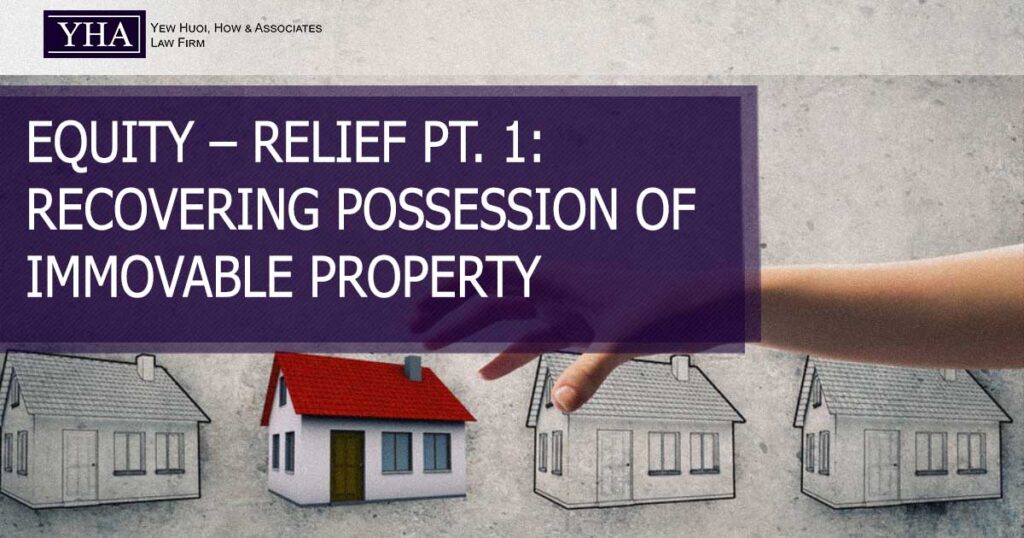Specific Relief is a type of judicial redress under the discretion of the courts to do equity. It arises from the equitable maxim “whenever there is a wrong, there must be a remedy” or “equity will not suffer a wrong to be without a remedy”. This is as opposed to damages and monetary compensation.
The type of relief that can be granted goes beyond granting damages under common law. Although certain types of relief (e.g. rectification of instruments, rescission of contracts, cancellation of instruments, and enforcement of public duties) in the Specific Relief Act 1950 (“SRA 1950”) have not been mentioned, under section 4 of SRA 1950, specific relief is given:-
- by taking possession of certain property and delivering it to the claimant;
- by ordering a party to do the very act which he is under an obligation to do;
- by preventing a party from doing that which he is under an obligation not to do;
- by determining and declaring the rights of parties otherwise than by an award of compensation; or
- by appointing a receiver.
Recovering Possession of Immovable Property
Under section 7 of the SRA, subsection (1) provides that a person entitled to the possession of specific immovable property may recover it in the manner prescribed by the law relating to civil procedure. This is contained in the procedures on summary proceedings for possession of land in the Rules of Court 2012 (“ROC 2012”) under order 89. Subsection (1) applies to a registered proprietor, tenant or licensee of immovable property acting against an unlawful occupier on the property. The word “may” in subsection (1) has been interpreted in Trustees of Leong San Tong Khoo Kongsi (Penang) Registered & Ors v Poh Swee Siang to mean that the person entitled to possession has the choice to either recovering possession through “self-help” or to resort to court action.
In the case of Er Eng Hong & Anor v New Kim Eng dan Tiap-Tiap Pemegang Yang Menduduki atas Sebahagian Tanah Yang Dikenali Sebagai HS(M) 2162 PTD 4403, Mukim Benut, Daerah Pontian, the court established that a landlord or his successor in title no longer has the self-help remedy of forcibly evicting the tenant or occupier. This means that a landlord may no longer take the law into his own hands when it comes to dispossessing a tenant over or any occupier on the land upon expiry of the tenancy.
Under section 7(2) of the SRA 1950, where a specific immovable property has been rented out under a tenancy, and that tenancy is terminated or comes to an end but the occupier continues to remain in occupation of the property or part thereof, the landlord shall not enforce his right to recover it against the occupier except by way of court proceedings. This section therefore applies to a tenant holding over, in other words, a tenant who has overstayed even after the end of the tenancy period.
Section 7(2) will only apply if three circumstances are fulfilled as follows:-
- there is a letting (renting out) of specific immovable property;
- the tenancy is terminated or has come to an end; and
- the occupier continues to remain in occupation of the property or part thereof.
Section 7(3) limits the application of section 7(2) to a lawful occupier at the beginning of the tenancy and so excludes unlawful occupiers.
Where a person entitled to possession dispossesses an occupier other than under section 7 of the SRA 1950, the occupier may act under section 8 of the SRA 1950 and claim possession of the property by showing that he has a better right to possession. The elements that must be proved by the occupier in an action for recovery of property under section 8 are as follows:-
- that he was dispossessed without his consent;
- that he was dispossessed other than in due course of law;
- that the suit is not against the government.

